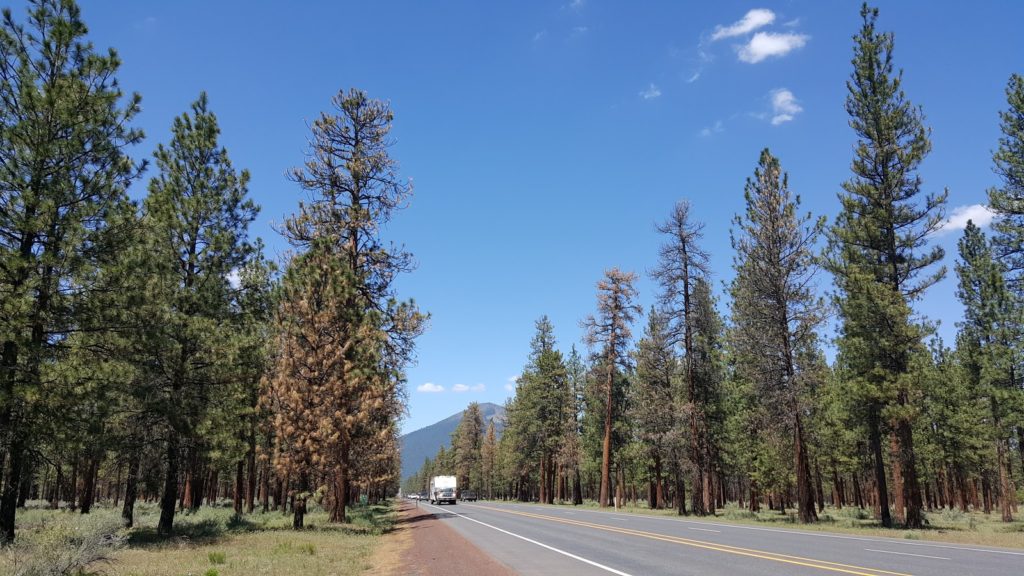
What began in 2013 with a few dead trees has become a major die-off along the highway that winds through the Cascade Range, connecting the verdant floor of the Willamette Valley to the high desert of central Oregon.
Over 1,400 ponderosa pines, some centuries old, have been killed, and more are expected to die. State and federal investigators blame their deaths on roadside spraying of the weed-killer aminocyclopyrachlor, or ACP, by Oregon’s Department of Transportation.
Toxic levels of ACP can still be found in area trees six years after the nearby roadside was last sprayed. The chemical is a known tree-killer whose label warns against letting it come into contact with the roots of desirable trees. But weed control specialists question whether other factors, like road de-icer and drought, might be involved.
The grove of dying trees has thrust a chemical known for its destruction on Midwestern golf courses and backyards nearly a decade ago into the spotlight in Oregon — exposing divides between state and federal pesticide regulation, and between environmental challenges on either side of the Cascades. Now, Oregon regulators are clamping down on a chemical that federal regulators banned under one name, but continued to license under another.
As environmental advocates from the Willamette Valley spearhead an effort to ban ACP and reduce pesticide use overall, public works officials from central and eastern Oregon are asking to keep a chemical they say is important for managing invasive plants that threaten native ecosystems, agricultural operations and roads.
Originally, ACP was sold by DuPont under the brand name Imprelis. When Imprelis came on the market in late 2010, it was a disaster: More than 30,000 customers complained of dead trees, and DuPont estimated that its liabilities would be in the hundreds of millions of dollars. DuPont soon yanked Imprelis off the market, shortly before the Environmental Protection Agency banned the herbicide in 2011. One might imagine trees nationwide breathed a collective sigh of relief, knowing the chemical had been given the death penalty.
But DuPont had also registered the same tree-killing chemical under a different brand name, Perspective. Perspective, which was later sold to Bayer, stayed on the market in part because it has different label instructions, which warn against spraying it near the root systems of “desirable” trees. And, until recently, there was no public outrage, because Perspective is marketed for public uses, such as roadside spraying, rather than more visible ones like lawn care or golf course maintenance.
State regulators, however, placed a temporary ban on the product in September, as the dead pines made headlines. Now, the Oregon Department of Agriculture is in the process of finalizing a rule that severely restricts the herbicide; it’s open for public comment until Feb. 26.
The new rule would prohibit roadside spraying of ACP, and limit its use to small patches or confined areas like mining and industrial sites. Rose Kachadoorian, the program manager for the state’s pesticide licensing program, said the Oregon Department of Agriculture is “weighing the risks and benefits” and acting with an “abundance of caution” in its proposed restrictions. Kachadoorian, the president-elect of the Association of American Pesticide Control Officials, said Oregon is the first state to put such comprehensive limits on ACP-based products.
But public-works managers who use ACP in central and eastern Oregon say the ban ignores the realities they face. “I feel like we can put a buffer around trees, but let’s not take it out of the hands of people in eastern Oregon,” where the arid climate means many areas are treeless, said Matt Wenick, weed coordinator for Grant County.
Wenick and Don Farrar, weed officer for Gilliam County in Oregon’s wheat belt along the Columbia River Basin, said ACP helps them control invasive species like leafy spurge, using fewer applications and avoiding older, more toxic chemicals. “It can’t hurt things in this area,” a wheat field-dominated landscape, where pesticides already play a major role in shaping the environment, Farrar said. “Invasive species should be a bigger deal for people who care about the environment than herbicides.”
Pesticide watchdogs and environmental health advocates, like Lisa Arkin, executive director of the nonprofit Beyond Toxics, would like to see Oregon completely ban ACP and implement plans that prioritize non-chemical controls for weeds and other pests. In 2013, state lawmakers passed legislation to promote such procedures, but Arkin said official practices don’t match the law’s intent.
Still, Arkin said, the new rule shows Oregon’s Department of Agriculture is stepping up on environmental protection. “Oregon is a leader for restricting ACP,” she said. “But they’re leading after a tragedy of old-growth pines being killed and an unknown amount of ongoing damage.” The harm to the environment and the cleanup costs, which will be paid for by taxpayers, “could have been avoided if EPA had taken action to take this chemical off the market in the first place.”
Carl Segerstrom is a contributing editor at High Country News, covering Alaska, the Pacific Northwest and the Northern Rockies from Spokane, Washington. Email him at [email protected] or submit a letter to the editor. This article originally appeared online at High Country News.
Leave a Reply